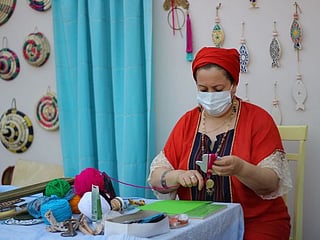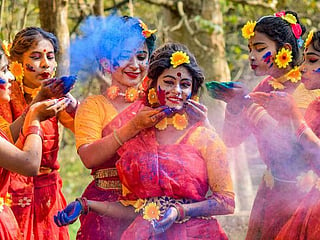Twenty-eight Emiratis become first Hope Makers after field work in fighting pandemic
Young Emiratis gained experience in community service under COVID-19 pandemic

Dubai: The Hope Makers Development Programme on Monday graduated its first cohort of young Emiratis, with COVID-19 serving as a live technical training and direct field experience in humanitarian, community, and relief work.
The global pandemic, with all its health, social, and economic repercussions, served as a learning ground on how to swiftly develop innovative initiatives in response to crises, which reflects the objective of the programme.
Launched in February 2020, under the directives of His Highness Shaikh Mohammad Bin Rashid Al Maktoum, Vice President and Prime Minister of the UAE and Ruler of Dubai, the programme is developed by Mohammad Bin Rashid Al Maktoum Global Initiatives (MBRGI) in collaboration with Dubai Future Council for Humanitarian Work and Mohammad Bin Rashid Centre for Leadership Development (MBRCLD).
Turning point
In his address to the graduating class, Mohammad Abdullah Al Gergawi, Minister of Cabinet Affairs and Secretary-General of MBRGI, said: “We can make 2021 a turning point in the future of humanitarian work, through highlighting the corporate aspect of it and developing Emirati talent that is capable of leading it. This will advance the UAE’s key role in responding to global crises and contribute to the nation’s pioneering status in the field of humanitarian work. In turn, achieving the vision of [Shaikh Mohammad] to support and encourage ambassadors of optimism, giving, and solidarity, who truly believe that the future is better.”
The first graduation ceremony of the programme was attended by Saeed Mohammad Al Eter, Chairman of UAE Government Media Office and Assistant Secretary General of MBRGI; Muna Al Kindi, CEO of MBRGI and board member of Dubai Future Council for Humanitarian Work; and Abdulla Al Rumaithi, Manager of MBRCLD.
Ambitious projects
The first graduating class of the programme, which merges academic education and intensive technical training, included 28 Emirati men and women who proposed five key projects that shape the future of humanitarian work and innovate new solutions in response to crises and challenges. During the ceremony, the graduating class presented the projects.
For the first project, the class developed a plan for an exclusive platform for training humanitarian workers through a series of general and specialised training programs. The second project was developing an information management system that allows data and best practices exchange between humanitarian and charitable institutions, with the aim of strengthening cross collaborations.
Third project
The third project focused on developing policies that govern social entrepreneurship to ensure an orderly legislative framework that facilitates the work of social entrepreneurs and highlights their positive impact on the society.
The fourth project explores boosting the public’s support for humanitarian work, through the development of a strategic breakdown of each initiative’s objectives and encouraging individuals to play an active role in the initiative.
The final project works to bolster the UAE’s status as a global hub for shaping the future of humanitarian work, through developing emerging community investment sectors and establishing a comprehensive ecosystem that attracts sector enthusiasts from around the world.
Interactive workshops
The programme was divided into two training phases. The first included a series of interactive workshops at the International Humanitarian City, which covered topics such as humanitarian work amid globalisation, 21st century developments affecting humanitarian work, and international organisations in humanitarian work, among others.
In the field
The second phase of the programme — initially meant to be a trip abroad to support a community in need in a remote area — shifted to become an in-country trip to support the nation’s efforts in its response to the global health pandemic. Programme participants volunteered to support key initiatives that were launched in the UAE, headlined by the ‘10 Million Meals’ campaign that was launched under the directives of Shaikh Mohammad, by his wife Her Highness Shaikha Hind Bint Maktoum Bin Juma Al Maktoum, Chairperson of the Board of Trustees of UAE Food Bank.
They also supported the Dubai Health Authority call centre staff in tracking COVID-19 cases, and the staff at the field hospital in Dubai.
Video series
Dubai Media Incorporated documented the participants’ journey in the program and will air its milestones, along with their inspiring stories, as a docuseries. The production will shed light on the challenges they faced and the obstacles they overcame to graduate as models of social work.
Ahmed Al Mansoori, CEO of Radio and Television Sector at Dubai Media Incorporated, said: “Our participation in the programme of ‘Preparing Hope Makers’ stemmed from our confidence in the ingenuity of the people of the Emirates and their ability to highlight the characteristics of their citizenship who love a spectrum of charitable work. The programme translates the wise leadership’s keenness to respect human values, especially in light of the COVID-19 pandemic that has afflicted all countries of the world.









